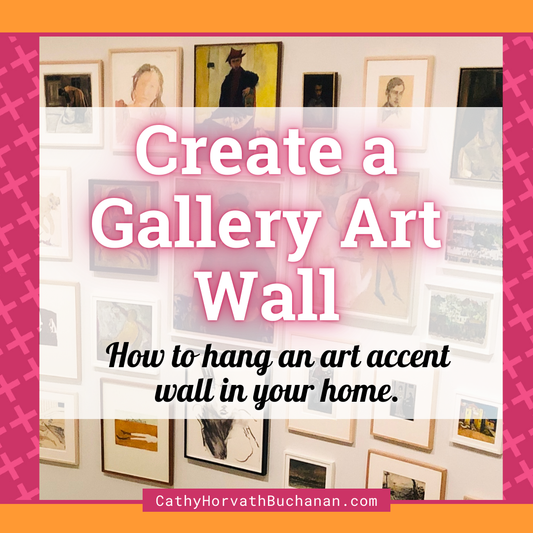
How to create an art gallery wall right in your own home...
Creating an art wall in your home is a fantastic way to infuse personality and style into your living space. An art wall not only serves as a focal point but also provides a unique opportunity to showcase your favorite pieces, from paintings and photographs to personal creations and mementos.
Whether you're a seasoned art collector or a novice decorator, designing a gallery style art wall can be a rewarding and creative project. In this guide, I'll will walk you through the steps to select the perfect wall, curate your art pieces, and arrange them in a visually stunning display.
Get ready to transform your blank walls into a captivating gallery that reflects your individual taste and flair.

Choosing the right wall for your art
Selecting the right wall is the first step in creating an art wall in your home. Look for a space that naturally draws attention, such as a living room, hallway, or bedroom. Consider the wall's size and how it fits with the overall room layout. A larger wall can accommodate bigger pieces or a more extensive collection, while a smaller wall might be perfect for a focused display.
Ensure the wall has good lighting, either natural or artificial, to highlight the artwork effectively, but also be mindful that choosing a wall in direct sunlight all day could fade or discolor your art. Also, consider the wall's color and texture, as these elements can complement or distract from your art.

Selecting the Perfect Art Pieces
Selecting the art for your wall is the exciting part of process that allows you to express your personality and taste. Start by choosing pieces you love! An art wall becomes more dynamic when it features a variety of art types.
Consider a mix of art forms, such as paintings, drawing, photographs, prints. You can also mix different genres, from abstracts to landscapes etc, in order to create a diverse visual narrative. Integrating three-dimensional pieces like sculptures or textiles can add texture and make the wall more engaging. Include pieces of varying sizes and shapes to create a balanced yet eclectic look.
Think about color schemes, themes, and styles that will create a cohesive look. The key is to have a connecting thread that ties all the pieces together, be it through color, theme, or style in order to maintain a harmonious balance that prevents the wall from looking cluttered.
The goal is to create a visually engaging and meaningful collection that reflects your unique style, while still having a curated elevated feel.

Arranging Your Art: Layout and Spacing Tips
The arrangement of your art pieces can significantly impact the overall effect of your art wall.
Start by laying out your artwork on the floor to experiment with different configurations before committing to hanging them. You can also create paper cutouts that are the same size as your art pieces so that you can easily play around with the arrangement by taping them to the wall.
Aim for a balanced composition, considering both the visual weight and spacing between pieces. Use a central focal point, like a large or particularly striking piece, and arrange other works around it.
Maintain consistent spacing between pieces to create a cohesive look, but feel free to play with symmetry and asymmetry for added interest. Using a level and measuring tape can help ensure precise placement.


Using Frames and Mounting Techniques
Frames and mounting techniques play a crucial role in the presentation of your art wall. Choose frames that complement both the artwork and the overall decor of the room.
A mix of frame styles can add interest, but be mindful of maintaining a sense of cohesion. For a modern look, consider frameless mounts or floating frames.
When hanging, ensure each piece is securely fastened, especially if using heavier frames or unconventional mounts. Picture hanging kits, adhesive hooks, and wall anchors can provide additional support. Experiment with different heights and orientations to add variety to your display.


Incorporating Lighting to Enhance Your Art Wall
Proper lighting is essential to showcase your art wall effectively. Natural light is ideal, but be mindful of direct sunlight, which can fade artwork over time. Use a combination of ambient, task, and accent lighting to highlight your pieces.
Track lighting, spotlights, or picture lights can draw attention to specific works and create a dramatic effect. Consider the color temperature of your lights; warm lights can enhance the richness of colors, while cooler lights can create a more modern and crisp look. Dimmers allow you to adjust the lighting to suit different moods and times of day.

DIY Art Projects for a Personal Touch
Adding DIY art projects to your wall can make it uniquely yours. Create custom pieces that reflect your interests and skills, such as paintings, collages, or mixed media works. Personal photographs, children's artwork, or mementos can add sentimental value.
Consider projects like framing vintage fabrics, creating shadow boxes, or designing your own abstract pieces. DIY projects not only save money but also allow you to experiment with different techniques and styles. They add a personal and intimate dimension to your art wall, making it a true reflection of your creativity.

Updating and Your Art Wall... and Beyond
Once your art wall is complete, it's important to maintain and periodically update it. Dust frames and artwork regularly to keep them looking fresh. Rotate pieces occasionally to keep the display dynamic and to prevent fading from prolonged exposure to light.
Adding new pieces or rearranging existing ones can refresh the look and keep it interesting. Consider seasonal or theme changes or add new acquisitions to keep the art wall evolving. Regularly assess the wall's overall balance and harmony, making adjustments as needed to ensure it remains a focal point of your home decor.
I should also mention that you can expand the idea, so that the display of your art collection is beyond just walls. In my home I create vignettes that encompass several art pieces along with other objects that match the vibe of the art. These are great for adding interest to any room, and because they aren't actually hung on the wall they're easy to switch out for a new display whenever you want a different look.


Conclusion
Creating an art wall in your home is a delightful and fulfilling project that can add character and elegance to any room. By carefully selecting the right wall, curating a diverse mix of art pieces, and thoughtfully arranging them, you can craft a display that is both visually appealing and deeply personal. Don't forget to incorporate proper lighting and consider DIY projects to add a unique touch. Regular maintenance and updates will keep your art wall looking fresh and vibrant.
With these tips, you'll be well on your way to creating an art wall that not only enhances your home decor but also brings joy and inspiration to your daily life.
Interested in creating your own gallery wall?... first you need to frame your art. Get my free framing guide!
I was named an expert in a Rent. article. Read the full article here: 20 Gallery Wall Ideas: Expert Examples and Tips for Inspiration (Rent. is a subsidiary of Redfin.com)







